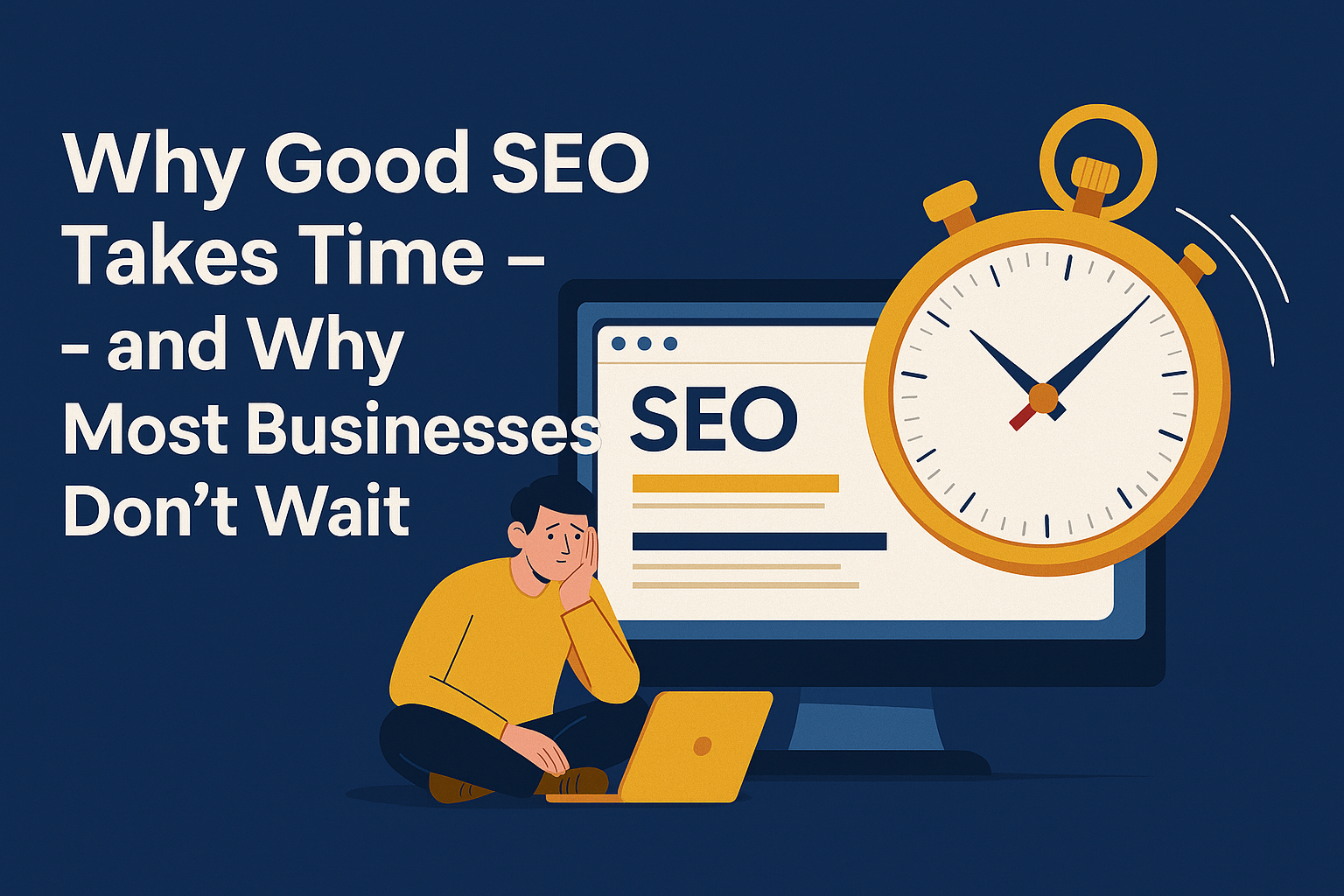You’re probably here because you’ve put time and effort into SEO, either for your own site or your client’s, but the results haven’t quite shown up yet. It’s frustrating, we get it. You may also want to know why Good SEO Takes Time. In the fast-moving world of digital marketing, waiting is hard. But here’s the truth: good SEO takes time. It’s not a quick fix, and many businesses lose patience before real progress starts to show up.
As a digital marketing agency, we’ve seen this story play out again and again. That’s why, in this article, we’re breaking down why an effective SEO checklist and effort takes time, what you can (and can’t) do to speed things up, and how to stay on the right track. Whether you’re a marketer or a business owner, stick around, not just to see results, but to grow sustainably in today’s competitive online world.
Major Reasons Why Good SEO Takes Time
Many industry experts admit this fact that SEO takes time. It takes 3 to 6 months when the website is brand new, and it takes a minimum of 2 months to show some noticeable results, after a fix or change.
Search engine optimisation (SEO) is not a quick fix. It involves improving your website so that search engines like Google trust and rank it higher. Because search engines must crawl, index, and evaluate every change you make, it can take months before you notice real improvements.
Here are some reasons why good SEO takes time. go through them and understand how complex it is, and how things are connected and depend on various factors.
1. Crawling and Indexing
After publishing a post/page or making any changes, normally, we submit it to Google Search Console. After that, Google’s bots (crawlers) visit your pages, understand their content, and decide where they fit in search results. This takes time, especially for new or updated pages.
However, it is observed that crawlers sometimes visit websites and pages instantly, but sometimes it takes time. How much? It depends on factors like the Website’s Authority, how frequently you update your website, technical ease, and quality.
2. Building Domain Authority
As you have understood till now, the domain authority is vital. Authority grows as other reputable sites link to you. Earning these backlinks means forming relationships and creating content worthy of sharing.
Many businesses try to create as many backlinks as possible, but you should choose the authentic way to earn backlinks. Website authority and backlinks play an important role in deciding the rank of the page or website on SERPs.
3. Crafting Quality Content
Quality content matters the most as crawlers will try to avoid spammy and meaningless content. Good SEO content requires research, planning, formatting, clear writing, and alignment with what your audience cares about. Rushing this step can hurt your rankings.
Good content also helps attract genuine searchers, and when they get what they are searching for will increase your reputation. These searchers can be converted to regular customers more easily. Additionally, other websites will link to you when you offer unique content, which improves the chances of getting top positions in SERPs.
4. Technical Optimization
Search engines love fast, smooth websites. But improving page speed, mobile friendliness, and user experience often involves deep fixes and testing. Those changes don’t happen overnight.
You might need to compress images, fix messy code, and clean up unnecessary plugins. That takes time. Mobile friendliness is a big deal, too. A site may look great on a desktop but break on a phone. Testing across devices, browsers, and screen sizes can’t be rushed.
And then there’s user experience – how easily visitors find what they’re looking for. Improving site structure and navigation often means deep changes. Developers might need weeks (or months) to do this right. The reward? A website that loads fast, feels smooth, and keeps people coming back.
5. Competitive Landscape
You’re not the only one working on SEO – your competitors are too. They’re updating their content, building links, and fixing their sites. To stay ahead, you have to study what they’re doing and then do it better. This means regular research, tracking their keywords, watching their backlinks, and noticing how often they publish and what kind of topics they cover.
It’s like playing chess. Each move you make depends on theirs. That’s why good SEO isn’t a one-time effort. It’s an ongoing game, and the winners are the ones who keep learning and adapting.
6. Continuous changing technologies
Technology has come a long way in the last few decades. The internet went from being a novelty to something we rely on every single day, from how we shop to how we communicate. And while this progress has made life easier in many ways, it also brings challenges, especially when it comes to SEO.
Search engines like Google, Bing, etc, are always tweaking the way they work. That means your website’s rank today might not be the same tomorrow. Even businesses that have put in tons of effort to rank well can suddenly drop down in search results, just because of a change in the algorithm.
The truth is, there’s no promise that the “rules or algorithm” of SEO will stay the same. As technology keeps evolving, businesses have to keep adapting too. It’s a moving target, and that’s part of what makes SEO both powerful and unpredictable.
Why Most Businesses Don’t Wait?
Most businesses can’t afford to wait for long-term strategies to deliver results. Whether it’s launching a product, entering a new market, or gaining traction with a target audience, speed and agility are often the deciding factors between gaining a competitive edge and losing ground. Patience is a virtue, but in business, timing is leverage.
Here’s why businesses tend to move swiftly:
- Immediate ROI pressure: Many startups and SMEs face investor or internal pressure to demonstrate traction quickly. Waiting for SEO to gradually build momentum over months may feel like a luxury.
- Fear of missing out (FOMO): When competitors adopt aggressive marketing tactics like PPC, influencer partnerships, or viral campaigns, decision-makers feel compelled to act now or risk falling behind.
- Evolving algorithms and shifting trends: With search engine algorithms constantly changing, there’s a perception that investing in SEO is chasing a moving target. Some businesses get frustrated with the lack of predictable wins.
- Past disappointments: For many, the decision to skip the wait is shaped by prior experiences. In fact, here is why business owners quit SEO.
Their stories reflect real concerns that are often overlooked in strategy discussions.
Instead of passively waiting, businesses should combine organic and paid promotion, short-term and long-term strategies to play the long-term game.
What Do I Do?
You, as an SEO professional or business owner, can do a few things to get the results faster. First things first, don’t stop. If you’re here, reading about why SEO takes time, you’re already ahead of the curve. You’re asking the right questions, and that curiosity is a powerful asset. SEO isn’t a sprint; it’s a long-distance run. So keep moving forward, even when progress feels slow.
That said, don’t pour all your energy into SEO alone. Yes, it’s important, but it’s not the only ingredient in your business’s success recipe. While you’re waiting for rankings to climb, focus on what you can control right now: building strong customer relationships, improving your website’s user experience, and optimising your conversion funnel. These efforts not only support SEO but also help you build a better business overall.
Also, keep in mind that you don’t need to be #1 on Google to win. Plenty of thriving businesses never hit that top spot. What matters more is creating value, being visible where your audience hangs out, and staying consistent.
Also, don’t underestimate the power of free marketing channels. Social media, community engagement, content marketing, and content sharing can all boost your visibility while your SEO strategy matures. These efforts often feed into your rankings without you even realising it.
You can also lean into your analytics. Tools like Google Analytics or SEMrush can show you what’s working, what’s not, and how you stack up against competitors. Use that data to reflect, refine, and realign your strategy. Being thoughtful and adaptive is what separates businesses that grow from those that stall.
In short? Stay patient, stay smart, and keep showing up. SEO rewards those who play the long game.
Good things take time
Chandigarh – India’s iconic symbol of planned modernity – wasn’t built in a day; it took years of planning and the effort of many people to reach where it is now. The same goes for SEO. Good and authentic SEO takes time to show results. But when the results start to appear on the surface, then it will be unmatched and last long. So, do your best, don’t forget to submit links to Search Console, and let crawlers understand and do their work.
If you need help in SEO or any other digital marketing strategy, feel free to contact us at VerveOnlineMarketing. We are one of the best online marketing agencies with decades of experience and around a thousand successful projects. So, what are you waiting for? Contact us now!
Frequently Asked Questions
Why does SEO take so long?
SEO takes time because it’s not just about making a few quick changes to your website. Search engines like Google look at many things, over 200 factors, before deciding where to rank your site. These include your content quality, backlinks from other websites, how fast your site loads, and how users interact with it. Also, Google needs time to crawl and index your pages.
How long does it take to get good SEO?
On average, it takes 3 to 6 months to start seeing noticeable results from SEO. If your website is brand new or in a competitive niche, it might take longer. But if you’re targeting less competitive keywords and consistently improving your site, you might see progress sooner, sometimes in as little as 3 months. The key is to stay consistent and not expect overnight success.
What is the 80/20 rule for SEO?
The 80/20 rule, also called the Pareto Principle, means that 80% of your SEO results often come from just 20% of your efforts. For example, a small group of your blog posts or keywords might bring in most of your traffic.
Why is SEO so difficult?
SEO is tough because it’s always changing. Google updates its algorithm frequently, and what worked last year might not work today. Plus, there’s a lot to juggle: technical setup, keyword research, content creation, link building, and user experience. On top of that, you’re competing with many other websites, some with bigger budgets or more authority.






